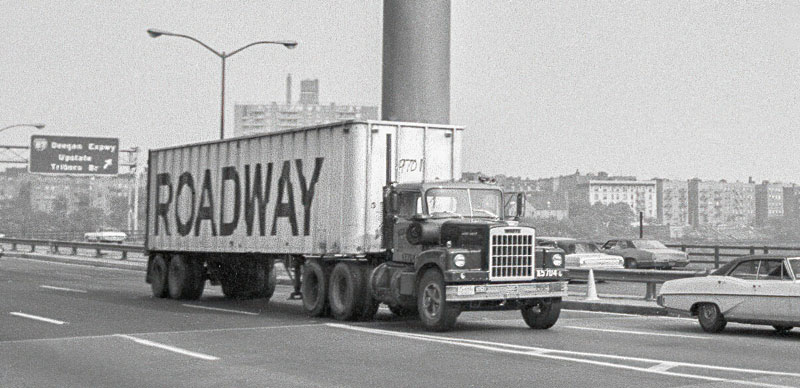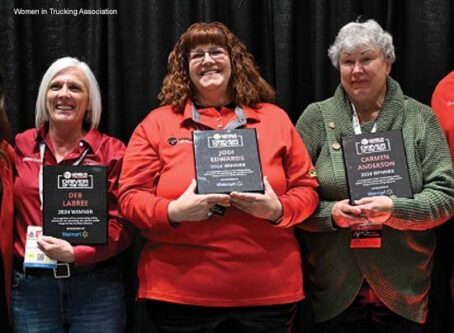Remembering the ‘R’ in YRC

Say goodbye to YRC. Last week, the LTL carrier based in Overland Park, Kan., announced it will change its name to Yellow – the “Y” in YRC. Personally, I’m going to miss “R.” Sort of, anyway. I’ll explain later.
“R” stood for Roadway Express of Akron, Ohio, once the second largest LTL in North America. Yellow Freight, the largest, bought Roadway in 2003. But Roadway always had more mojo, with its name emblazoned in huge, block capital letters across the length of its trailers.
ROADWAY.
No other logo represented big trucking quite like those 34,500 trailers that could be seen virtually everywhere – most frequently in the East and Midwest. Roadway linehaul units seemed only minutes apart at night along the interstate highways between its huge breakbulk terminal in Harrisburg, Pa., and local service terminals from the New York metro area. One of those was a sprawling Roadway terminal in Kearny, N.J., where I once applied for and almost got a management trainee job as a dock supervisor. It was a close call.
I wanted a Teamster driving job, of course, but could not find one. It was the spring of 1967, and I was engaged to marry my wife, Peggy, that October. Her upstate New York parents would not be happy to see their beautiful daughter marry an unemployed guy from North Jersey. I had already been rejected for a job at one carrier and needed to land the spot at Roadway.
I interviewed twice and took a battery of tests to determine that I was human, could speak English, and knew how to use a telephone. It was time for my third and final sit-down with Terminal Manager Shel Himber. Funny how I remember that name more than half a century later.
Shel lets me know I’ve got the job, then begins telling me what a great opportunity it was, how my future at Roadway was unlimited, how I would earn a good living for my future family. It was a pep talk, like a locker room speech at half time. Shel was the coach. I was the team.
“Don’t kid yourself. It’s going to be tough and you have to be up to it,” he said. “The sky’s the limit at Roadway, but it will be a lot of hard work. This is a 24-hour business. You’ll be working nights and weekends. You’ll be on call whenever we need you.”
Coach Shel put on his best inspiring, determined face.
“Are you ready for the challenge?”
There was a pause. I thought of Peg all by herself at night, on weekends, and whenever Roadway might need me.
“Uh, no. I don’t think so,” I said.
Twenty-two years later in 1999 as a writer for Heavy Duty Trucking Magazine, I interviewed Roadway’s then-president Jim Staley at headquarters in Akron. Turned out that only four years after I had said no to Shel Himber, a young Jim Staley started at Roadway as a dock supervisor trainee. The sky was the limit after all.
Roadway did well in the 1960s and 1970s, but its fortunes peaked and turned downward after deregulation in 1980. While competitor Consolidated Freightways started nonunion Conway (now XPO), Roadway went in a different direction, launching Roadway Package System. RPS, as it was known, wasn’t an LTL, but a parcel carrier in direct competition with the mighty UPS.
So why do I think of Roadway less fondly than I otherwise might?
Starting small in 1984, Roadway’s RPS quickly grew into a national service taking business from UPS with customer service and technology. At least that’s what the official story stressed. More significantly, they beat UPS rates. They were not simply nonunion. RPS didn’t hire drivers at all. Instead, they used contractors. The RPS price advantage corresponded directly with pay and benefits they did not provide. In fact, many drivers worked not as contractors themselves but for contractor fleets – yet another level of profit skimmed from driver compensation.
In 1998, FedEx bought RPS and in 2000 renamed the company FedEx Ground.
FedEx Ground still retains the ugly contractor model of RPS, perhaps a principle reason they bought the company in the first place. In any case, it’s a regrettable legacy for Roadway Express.
One more thing. In that 1999 interview, Roadway’s Staley noted the Teamster company was picking up truckload business in the overheated economy that preceded the 2000 “dot com bust.” Even then, the truckload sector moaned over what it falsely called a “driver shortage.” There would be no such “shortage,” Staley noted, if driver pay was fair.
“If you look at our statistics, our truckload business is growing 10, 15% right now because we have drivers and they don’t. They have missed business opportunities because their drivers just aren’t being compensated for what they do,” Staley said. “Everything falls on the driver in terms of waiting time at the shipper or consignee and low rates of pay. Ultimately, it’s trucks and drivers that haul the freight.” LL









